INLAND EMPIRE
// As is typical with Lynch's most outlandish, moderately surrealist films (as opposed to severely and unbearably, such as Eraserhead) Laura Dern is his leading lady, perfectly revealing the underlying neurosis and darkest recesses of the seemingly innocent, wholesome all-American woman; INLAND EMPIRE is no exception to the rule. Dern's bewildering yet emotive scream of a performance is brilliant as another martyred blonde who may or may not be countless people/natives/characters; literally, Dern portrays and/or channels numerous women 'in trouble' in worlds within worlds, an exciting aspect explored in some of Lynch's films. Transcendental meditation, one of Lynch's interests, seems to be one of the main components of INLAND EMPIRE, whereby the mystery develops in alternate characters, situations, states and separate borders: Hollywood, LA and Poland. In terms of precedent due to the location and subject matter, Mulholland Drive is dreamy, polished and coherent, whereas INLAND EMPIRE is digitally-filmed, raw and deeply unfathomable. Despite obvious differences, the two films share many connections; Lynch's vision of 'Hollywood Turned Upside Down' and its deranged, depressed blonde wannabe starlets. I suggest to anyone of a nervous disposition never to watch both films on a loop considering how similarly menacing and bizarre they both are; prepare to be haunted for days, weeks or even months, by recurring images of bums, dwarves, gypsies, human rabbits, facial metamorphoses, dying phantoms and blue boxes/keys. Although Mulholland Drive is Lynch's magnum opus, INLAND EMPIRE is definitely to be appreciated as one his greatest masterpieces, simply because it takes the Lynch format and blows it out of the water, creating his darkest, most indecipherable work.
Despite the consecutive brilliance of Eraserhead, The Elephant Man and Blue Velvet, Lynch entered post-modern cinema alternating between his best work with his worst - Dune, which followed Blue Velvet, Wild at Heart, which arrived alongside Twin Peaks, and then the blip that was necessary for his astonishing millennium oeuvre, Lost Highway) but INLAND EMPIRE was an exception to this pattern and proved to be even more nightmarish, delirious and bewildering than all of his post-modern cinematic output put together; it is an unsolvable puzzle of extraordinary visual dynamic, always either portentous or horrifying, there's no lightness or any intentional comic darkness to be had, nothing is so weird its funny, it veers towards horror in its climactic moments and returns to magic realism and fantasy, somewhat angling Alice In Wonderland. INLAND EMPIRE, as with Mulholland Drive, goes beneath the contemporary, ruthless, decaying veneer of beautiful, dreamy Hollywood and exposes it as a dark, sinister nightmare of performance art, conspiracy and tragedy. To truly absorb its abrasive atmosphere and dizzying camera work, watch it at least three times before watching it again for further examination.
On a final note, let's hope Lynch hasn't retired, but if so, he has delivered an impenetrable work of genius, the perfect swansong, collecting fragments of each of his greatest films and examining completely alternate techniques to present the kind of disturbing imagery and grandiose, metaphysical ideas only Luis Bunuel would dare attempt to release into the mainstream.
All reviews -
Movies (15)
Inland Empire review
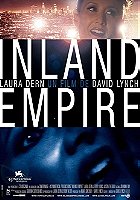 Posted : 12 years, 6 months ago on 23 December 2012 06:36
(A review of Inland Empire)
Posted : 12 years, 6 months ago on 23 December 2012 06:36
(A review of Inland Empire) 0 comments, Reply to this entry
0 comments, Reply to this entry
Mulholland Drive review
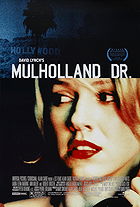 Posted : 12 years, 6 months ago on 21 December 2012 05:43
(A review of Mulholland Drive)
Posted : 12 years, 6 months ago on 21 December 2012 05:43
(A review of Mulholland Drive)Mulholland Dr.
// Those who previously feared that Lynch's oeuvre had dwindled since Twin Peaks: Fire Walk With Me should rejoice, for Mulholland Dr. marks the surrealist filmmaker's return to greatness. No more moribund dalliances with heavy metal or tractors; Lynchian trademarks are back with a vengeance, fusing mystery, magic realism, dwarves (this time only the head is small on The Man From Another Place, who is now a Hollywood kingpin) with atypical weirdness, exploring a society swirling in its own darkness and secrets with an array of characters armed with darkly comic, oddball dialogue. Linear narrative is very much absent, replaced with an entirely confusing, twisting, turning Mobius strip variation of the non-linear model. Lynch orchestrates an utterly beautiful, dreamy vision of the undulating city of dreams itself, Hollywood, Los Angeles. Focusing on perky, idealistic Ontario jitterbug champion Betty Elms and her arrival into such a realm, Lynch crafts his daring execution at first as a mystery/romance similar to Hollywood and pulp fiction, albeit with two female leads. Naomi Watts is the revelation of the two, displaying an intrepid duality in her extraordinary, multi-layered performance; we fall in love with the radiant, sweet and talented Betty only to discover that she is not real, simply the dreamt ideal of depressed, tragic Hollywood casualty Diane Selwyn (the nightmarish reality) martyred example of unrequited love, the personification (i.e. the bum outside Winkie's) of guilt, regret and hopelessness. With glamorous, particularly crystalline visuals almost too perfect for Lynch's usual style, Mulholland Dr. often enters the realm of devastatingly raw, dark human recesses and a tapestry of unease and foreboding which unfolds into an unaccountable menace. Even the most portentous of scenes are disturbing, frequently and unbearably so in the last chapter of the film; alternatively, in the first chapters, it sometimes descends into bizarre farce and Nancy Drew mystique. Lynch's contradictions are evident, leaving the audience clamouring for answers they will never find; artistry and clues already plant the idea, but Lynch's genius is allowing the viewer to come to their own conclusion.
After all, at the crucial point where the plot seems poised on the brink of resolution, the film disappears into a black hole from which it reappears more contrary than ever. That this is, in fact, the twist that binds the threads together probably won't occur until long after the credits roll. But then, this isn't a film to be followed in the traditional sense; it's one to let wash over you, one to wallow in.
If you need to understand rather than feel, then you can call it comprehensible in some ways, its fractured, sensual lyricism explores a tragic love whereby identity, rivalry, power and jealousy foray into an everlasting, beautiful romance, with the formerly troublesome roles reversed and happiness envisioned as the closing image of Diane's fever dream (and the film itself). As with most of Lynch's films, it has many interpretations and allusions, but in a film half set in a woman's subconscious version of Hollywood and the stark, decaying reality, you can view it any way you want to and still be rewarded with new details each time, that to me is the definition of a masterpiece. Silencio.
// Those who previously feared that Lynch's oeuvre had dwindled since Twin Peaks: Fire Walk With Me should rejoice, for Mulholland Dr. marks the surrealist filmmaker's return to greatness. No more moribund dalliances with heavy metal or tractors; Lynchian trademarks are back with a vengeance, fusing mystery, magic realism, dwarves (this time only the head is small on The Man From Another Place, who is now a Hollywood kingpin) with atypical weirdness, exploring a society swirling in its own darkness and secrets with an array of characters armed with darkly comic, oddball dialogue. Linear narrative is very much absent, replaced with an entirely confusing, twisting, turning Mobius strip variation of the non-linear model. Lynch orchestrates an utterly beautiful, dreamy vision of the undulating city of dreams itself, Hollywood, Los Angeles. Focusing on perky, idealistic Ontario jitterbug champion Betty Elms and her arrival into such a realm, Lynch crafts his daring execution at first as a mystery/romance similar to Hollywood and pulp fiction, albeit with two female leads. Naomi Watts is the revelation of the two, displaying an intrepid duality in her extraordinary, multi-layered performance; we fall in love with the radiant, sweet and talented Betty only to discover that she is not real, simply the dreamt ideal of depressed, tragic Hollywood casualty Diane Selwyn (the nightmarish reality) martyred example of unrequited love, the personification (i.e. the bum outside Winkie's) of guilt, regret and hopelessness. With glamorous, particularly crystalline visuals almost too perfect for Lynch's usual style, Mulholland Dr. often enters the realm of devastatingly raw, dark human recesses and a tapestry of unease and foreboding which unfolds into an unaccountable menace. Even the most portentous of scenes are disturbing, frequently and unbearably so in the last chapter of the film; alternatively, in the first chapters, it sometimes descends into bizarre farce and Nancy Drew mystique. Lynch's contradictions are evident, leaving the audience clamouring for answers they will never find; artistry and clues already plant the idea, but Lynch's genius is allowing the viewer to come to their own conclusion.
After all, at the crucial point where the plot seems poised on the brink of resolution, the film disappears into a black hole from which it reappears more contrary than ever. That this is, in fact, the twist that binds the threads together probably won't occur until long after the credits roll. But then, this isn't a film to be followed in the traditional sense; it's one to let wash over you, one to wallow in.
If you need to understand rather than feel, then you can call it comprehensible in some ways, its fractured, sensual lyricism explores a tragic love whereby identity, rivalry, power and jealousy foray into an everlasting, beautiful romance, with the formerly troublesome roles reversed and happiness envisioned as the closing image of Diane's fever dream (and the film itself). As with most of Lynch's films, it has many interpretations and allusions, but in a film half set in a woman's subconscious version of Hollywood and the stark, decaying reality, you can view it any way you want to and still be rewarded with new details each time, that to me is the definition of a masterpiece. Silencio.
 0 comments, Reply to this entry
0 comments, Reply to this entry
Blade Runner review
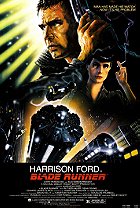 Posted : 12 years, 6 months ago on 17 December 2012 10:10
(A review of Blade Runner)
Posted : 12 years, 6 months ago on 17 December 2012 10:10
(A review of Blade Runner)Blade Runner: The Final Cut.
// Directed by the visionary film-maker Ridley Scott, with its post-modern, polluted, rain-soaked neon LA epicentre, the extraordinary production design of Blade Runner presents a startlingly familiar dystopia of corporate advertising, technology, and the unequivocal, blurry line between human and machine. Along with Alien, Scott's genre-bending sci-fi hallmark, Blade Runner uses - instead of latent horror elements - noir mood and style adversely to stray from the film's endless layers of religious symbolism; commercialism; industrialism; and humanism. All are of which seem obvious in retrospect, but not upon the initial viewing. To fully absorb and find yourself transported into the world of Scott's masterpiece, you have to watch it at least eight times. The Final Cut is much better for its deletions and polished visual/ editorial technical upheaval (with added dream sequence and happy ending) than the 1982 version - such as the removal of Deckard's voice-over - becoming an entirely balanced film because of its changes, nevertheless these combined themes and messages are re-birthed as ambiguity, unable to galvanise into anything definite. With this, Scott finally alluded to the possible fact that Deckard was a replicant, somewhat registering a tragic edge to the film's 'happy ending' of sorts.
From its shimmering, sublime imagery to the poetic language of its tragic characters, Blade Runner is an unrivalled cinematic gem, capturing noirish, astonishingly brutal 'termination' sequences reminiscent of the action genre with remarkable boldness(humanised villains dying in slow motion and/or metaphysically/artistically) and enigmatic beauty (Roy Batty's conclusive monologue scene) atypical of art movies. Blade Runner transcends all of its conventional gestures in the cinematic realm, it is neither science fiction nor action, perhaps not any genre can define this film in its entirety. Once the end credits have rolled, you will not find any words to explain or describe its power, beyond its superficial exterior and lavish production design, there is an incredibly raw exploration of humanity, perhaps even the meaning of life itself.
Many fans have examined the film as religious, and its not hard to see why from Roy Batty's self-inflicted crucifixion, the symbolic dove, and Tyrell's God-like creator of replicants watching from above the city. Whatever the outcome of its content/subtext, there is no questioning the film's power. For me, it is more life-affirming and heartbreaking than most tearjerkers; you have to be made of stone not to gulp back the sobs at the unicorn dream and the gloriously philosophical 'Tears in Rain' scene, largely ascertaining life and death in one speech, even Deckard is moved. You can't call Blade Runner anything else but a masterpiece, its quintessential cinema: multi-layered, expansive and soulful, there's no box it doesn't tick in terms of valuable, influential and quality film-making. For me, its quite simply a perfect film; do not resist its deeper innards beyond the visual spectacle and you will be rewarded with something magical.
// Directed by the visionary film-maker Ridley Scott, with its post-modern, polluted, rain-soaked neon LA epicentre, the extraordinary production design of Blade Runner presents a startlingly familiar dystopia of corporate advertising, technology, and the unequivocal, blurry line between human and machine. Along with Alien, Scott's genre-bending sci-fi hallmark, Blade Runner uses - instead of latent horror elements - noir mood and style adversely to stray from the film's endless layers of religious symbolism; commercialism; industrialism; and humanism. All are of which seem obvious in retrospect, but not upon the initial viewing. To fully absorb and find yourself transported into the world of Scott's masterpiece, you have to watch it at least eight times. The Final Cut is much better for its deletions and polished visual/ editorial technical upheaval (with added dream sequence and happy ending) than the 1982 version - such as the removal of Deckard's voice-over - becoming an entirely balanced film because of its changes, nevertheless these combined themes and messages are re-birthed as ambiguity, unable to galvanise into anything definite. With this, Scott finally alluded to the possible fact that Deckard was a replicant, somewhat registering a tragic edge to the film's 'happy ending' of sorts.
From its shimmering, sublime imagery to the poetic language of its tragic characters, Blade Runner is an unrivalled cinematic gem, capturing noirish, astonishingly brutal 'termination' sequences reminiscent of the action genre with remarkable boldness(humanised villains dying in slow motion and/or metaphysically/artistically) and enigmatic beauty (Roy Batty's conclusive monologue scene) atypical of art movies. Blade Runner transcends all of its conventional gestures in the cinematic realm, it is neither science fiction nor action, perhaps not any genre can define this film in its entirety. Once the end credits have rolled, you will not find any words to explain or describe its power, beyond its superficial exterior and lavish production design, there is an incredibly raw exploration of humanity, perhaps even the meaning of life itself.
Many fans have examined the film as religious, and its not hard to see why from Roy Batty's self-inflicted crucifixion, the symbolic dove, and Tyrell's God-like creator of replicants watching from above the city. Whatever the outcome of its content/subtext, there is no questioning the film's power. For me, it is more life-affirming and heartbreaking than most tearjerkers; you have to be made of stone not to gulp back the sobs at the unicorn dream and the gloriously philosophical 'Tears in Rain' scene, largely ascertaining life and death in one speech, even Deckard is moved. You can't call Blade Runner anything else but a masterpiece, its quintessential cinema: multi-layered, expansive and soulful, there's no box it doesn't tick in terms of valuable, influential and quality film-making. For me, its quite simply a perfect film; do not resist its deeper innards beyond the visual spectacle and you will be rewarded with something magical.
 0 comments, Reply to this entry
0 comments, Reply to this entry
Twin Peaks: Fire Walk with Me review
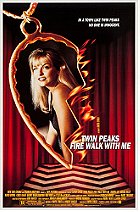 Posted : 12 years, 9 months ago on 28 September 2012 08:17
(A review of Twin Peaks: Fire Walk with Me)
Posted : 12 years, 9 months ago on 28 September 2012 08:17
(A review of Twin Peaks: Fire Walk with Me)David Lynch's feature-length prequel to his cult series "Twin Peaks" depicts, in assiduous detail, the last seven days in the life of its morally ambiguous, self-destructive and deeply troubled 17-year-old catalyst Laura Palmer.
"Fire Walk With Me" in itself surpasses the masterful TV pilot with inherent strangeness, perversity, excoriating beauty and magic realism. Lynch reveals the side of this quiet American town that could never be shown on television, thus delving further into the darkest secrets of Twin Peaks. Laura is visualised on a constantly alternating moral spectrum: she volunteers at Meals on Wheels, is the high school Homecoming queen, and the darling of her parents, community and friends. However, Laura led a double life — she was victimised by abuse, suffered unusual dreams and often prostituted herself to fund a secret cocaine habit; the film unveils the crux of her character and its contradictions.
Of its lyrical, inexplicable imagery and symbolism the film's stand-alone merits are expansive, but the power lies within its ability to transmogrify an entire television series into an infinite whirlpool of weirdness that will never be unplugged. "Fire Walk With Me" is one of Lynch's most twisted neighbourhood visions, albeit with an emotive core similar to "Blue Velvet". Lynch did not care for the limitations of television (hence the ironic opening image, a smashed TV set) and reiterated the world of Twin Peaks to match his prevalent ideas of underlying perversity in white-picket fenced suburbia: the hidden nightmare this time being incest and murder via soul possession connected with BOB and the Red Room/White/Black Lodges. Whatever the case of Lynch's trademark ambiguity, the mystery of Twin Peaks, its extradimensional spaces and spirits are all part of its incomparably twisted beauty, whether you get it or not; the final sequence of Laura's implied passing over into the White Lodge is a Lynchian trait: the existential happy ending seen in his most recent films "Mulholland Dr." and "INLAND EMPIRE".
I think of the film as an indefinite part of the series cannon, without it "Twin Peaks" would not have come full circle as most of Lynch's films do, there would be no resolution for Laura Palmer and that last image of her angel is exquisitely unforgettable. I recommend it to anyone who is a Lynch fan, but at its heart, aside from the supernatural elements, it is a film about incest and the torment, loneliness, shame, guilt and devastation of its victims.
"Fire Walk With Me" in itself surpasses the masterful TV pilot with inherent strangeness, perversity, excoriating beauty and magic realism. Lynch reveals the side of this quiet American town that could never be shown on television, thus delving further into the darkest secrets of Twin Peaks. Laura is visualised on a constantly alternating moral spectrum: she volunteers at Meals on Wheels, is the high school Homecoming queen, and the darling of her parents, community and friends. However, Laura led a double life — she was victimised by abuse, suffered unusual dreams and often prostituted herself to fund a secret cocaine habit; the film unveils the crux of her character and its contradictions.
Of its lyrical, inexplicable imagery and symbolism the film's stand-alone merits are expansive, but the power lies within its ability to transmogrify an entire television series into an infinite whirlpool of weirdness that will never be unplugged. "Fire Walk With Me" is one of Lynch's most twisted neighbourhood visions, albeit with an emotive core similar to "Blue Velvet". Lynch did not care for the limitations of television (hence the ironic opening image, a smashed TV set) and reiterated the world of Twin Peaks to match his prevalent ideas of underlying perversity in white-picket fenced suburbia: the hidden nightmare this time being incest and murder via soul possession connected with BOB and the Red Room/White/Black Lodges. Whatever the case of Lynch's trademark ambiguity, the mystery of Twin Peaks, its extradimensional spaces and spirits are all part of its incomparably twisted beauty, whether you get it or not; the final sequence of Laura's implied passing over into the White Lodge is a Lynchian trait: the existential happy ending seen in his most recent films "Mulholland Dr." and "INLAND EMPIRE".
I think of the film as an indefinite part of the series cannon, without it "Twin Peaks" would not have come full circle as most of Lynch's films do, there would be no resolution for Laura Palmer and that last image of her angel is exquisitely unforgettable. I recommend it to anyone who is a Lynch fan, but at its heart, aside from the supernatural elements, it is a film about incest and the torment, loneliness, shame, guilt and devastation of its victims.
 0 comments, Reply to this entry
0 comments, Reply to this entry
Surrogates review
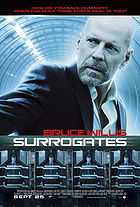 Posted : 12 years, 10 months ago on 2 September 2012 02:53
(A review of Surrogates)
Posted : 12 years, 10 months ago on 2 September 2012 02:53
(A review of Surrogates)Went to see this at the cinema three years ago and wanted to walk out half-way through, but I was mesmerised by Bruce Willis and his blond wig, I just had to stay and laugh. Apart from that acceptably hilarious oddity, its an utterly rubbish "sci-fi flick" built around the concept of unflawed robotic versions of the human form who are not to be trusted. CLEARLY THE FILMMAKER WAS TRYING TO BE PRETENTIOUS, BUT ONLY ENDED UP BEING DULL, OVERCOOKED AND SILLY.
 0 comments, Reply to this entry
0 comments, Reply to this entry
 Login
Login
 Home
Home 6 Lists
6 Lists 15 Reviews
15 Reviews Collections
Collections